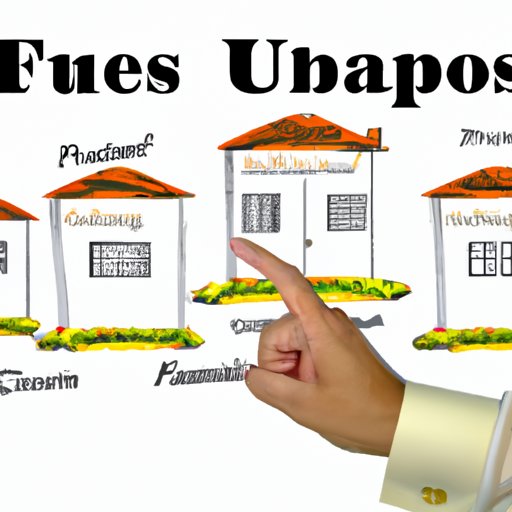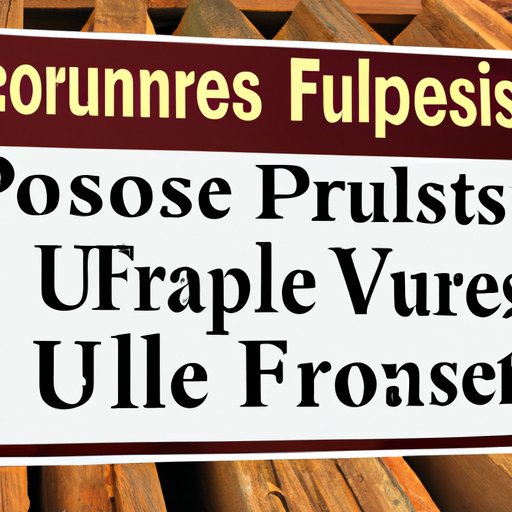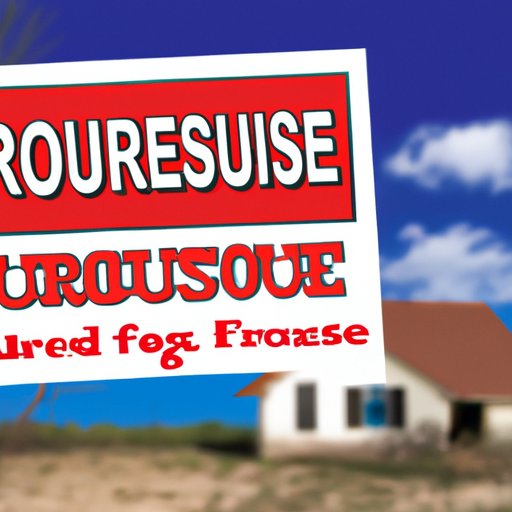Introduction
Foreclosure is the legal process by which a lender, such as a bank or mortgage company, takes possession of a property from its owner when they fail to make payments on their loan. When a homeowner defaults on their loan, the lender will initiate the foreclosure process in order to recover the owed amount. Buying a foreclosure can be an affordable way to purchase a home, but it’s important to understand the process and potential risks before making an offer.

Explaining the Different Types of Foreclosures
There are three main types of foreclosures: pre-foreclosure, auction, and bank-owned. Each type of foreclosure has its own set of rules and regulations, and understanding the differences between them can help you decide which type is right for you.
Pre-Foreclosure
Pre-foreclosure occurs when a homeowner is behind on their mortgage payments and the lender has initiated the foreclosure process. The lender will typically allow the homeowner a certain amount of time to catch up on the missed payments before the property is put up for sale at auction. During this time, the homeowner may try to find a buyer who is willing to purchase the property at a reduced price in order to avoid foreclosure.
Auction
When the pre-foreclosure period ends, the property will be put up for sale at an auction. Auctions are open to the public, and buyers must submit a bid in order to purchase the property. The highest bidder will win the property, but it’s important to remember that all sales are final, so it’s important to research the property thoroughly before submitting a bid.
Bank-Owned
If a property does not sell at auction, it will become bank-owned. Bank-owned properties are typically listed through a real estate agent, and buyers must submit an offer to the bank in order to purchase the property. It’s important to note that banks will typically require a higher down payment for bank-owned properties than other types of foreclosures.
Outlining the Steps in the Foreclosure Process
The process of buying a foreclosure varies depending on the type of foreclosure. Here are the steps you need to take for each type.
Pre-Foreclosure
When buying a pre-foreclosure, there are several steps you need to take.
Researching the Property
Before making an offer on a pre-foreclosure, it’s important to do your research. Look into the condition of the property and any potential issues that may affect its value. Check with local authorities to see if there are any liens or unpaid taxes associated with the property.
Making an Offer
Once you’ve done your research and determined the fair market value of the property, you can make an offer to the homeowner. Make sure to include any contingencies, such as inspections or financing, in the offer.
Negotiating with the Seller
Once the homeowner receives your offer, they may counteroffer with a different price or terms. Be prepared to negotiate until both parties are satisfied with the agreement.
Auction
When buying a foreclosure at auction, there are a few things you need to keep in mind.
Preparing to Bid
Before attending an auction, it’s important to do your research. Research the property, the terms and conditions of the sale, and any potential issues that may affect its value. Make sure to bring enough cash or a cashier’s check to cover the cost of the winning bid.
Understanding the Terms and Conditions of the Sale
It’s also important to understand the terms and conditions of the sale. Most auctions require a deposit of 10% of the winning bid, and the remaining amount must be paid within 30 days. Be sure to read and understand the terms and conditions before submitting a bid.
Submitting a Winning Bid
Once you’ve done your research and understand the terms and conditions of the sale, you can submit a bid. If your bid is accepted, you will be required to pay the deposit and sign the paperwork immediately. All sales are final, so be sure to inspect the property before submitting a bid.
Bank-Owned
When buying a bank-owned foreclosure, there are a few steps you need to take.
Finding Bank-Owned Properties
The first step in purchasing a bank-owned property is to find one. You can search online for bank-owned properties or work with a real estate agent who specializes in foreclosures. The bank may also list the property on their website.
Making an Offer
Once you’ve found a property you’re interested in, you can make an offer to the bank. Be sure to include any contingencies, such as inspections or financing, in the offer.
Working with the Bank
The bank may counteroffer with a different price or terms. Be prepared to negotiate until both parties are satisfied with the agreement. Once the offer is accepted, the bank will provide you with the necessary paperwork and instructions for closing the sale.
Discussing the Pros and Cons of Buying a Foreclosure
Buying a foreclosure can be an affordable way to purchase a home, but there are some potential risks involved. Here are some of the pros and cons to consider.
Pros
The biggest benefit of buying a foreclosure is the potential savings. Foreclosures are usually sold at a discounted price, so you may be able to purchase a property at a lower cost than a comparable non-foreclosure home. Foreclosures can also be a good investment, as they may appreciate in value over time.
Cons
One of the drawbacks of buying a foreclosure is the risk of hidden defects. Many foreclosures have been neglected by the previous owners, so it’s important to inspect the property thoroughly before making an offer. Additionally, foreclosures can be difficult to finance, as most lenders are hesitant to lend money for a property with a history of nonpayment.
Exploring Financing Options for Buying a Foreclosure
When financing a foreclosure, it’s important to research your options. Here are some of the most common financing options for buying a foreclosure.
FHA Loans
FHA loans are government-insured loans that are designed to make homeownership more accessible. FHA loans are available to buyers with less-than-perfect credit and only require a 3.5% down payment. However, buyers must meet certain income requirements and must pay an upfront mortgage insurance premium.
VA Loans
VA loans are government-backed loans available to veterans and active duty military personnel. VA loans require no down payment and no private mortgage insurance, but borrowers must meet certain service requirements. VA loans also have competitive interest rates and flexible credit requirements.
Conventional Loans
Conventional loans are loans offered by private lenders and are not insured by the government. Conventional loans typically require a higher down payment than other types of loans, but they offer competitive interest rates and flexible repayment terms. Additionally, buyers with good credit may be able to qualify for a lower interest rate on a conventional loan.

Describing Common Pitfalls to Avoid When Buying a Foreclosure
In addition to researching financing options, it’s important to be aware of the potential pitfalls of buying a foreclosure. Here are some of the most common problems to look out for.
Inspections
It’s important to have the property inspected by a qualified professional before making an offer. Inspectors can identify potential problems with the property that may affect its value or safety.
Title Issues
Make sure to check the title of the property to ensure there are no outstanding liens or judgments against it. Title issues can delay or even prevent the sale of the property, so it’s important to do your due diligence.
Undisclosed Liens
It’s also important to check for any undisclosed liens or judgments against the property. Undisclosed liens can cause major delays in the closing process and can even result in the loss of the property.

Examining the Benefits of Working with a Real Estate Agent for Buying a Foreclosure
Working with a real estate agent can be beneficial when buying a foreclosure. Here are some of the advantages of working with an agent.
Knowledge and Expertise
Real estate agents have knowledge and expertise in the foreclosure process. They can help you navigate the process and answer any questions you may have.
Negotiation Skills
Real estate agents are experienced negotiators and can help you get the best possible deal on a foreclosure. They can also help you avoid potential pitfalls and protect your interests throughout the transaction.
Access to Resources
Real estate agents have access to resources that can help you find the perfect foreclosure. They can search for properties that meet your criteria and provide you with information about the local market.
Conclusion
Buying a foreclosure can be an affordable way to purchase a home. By understanding the different types of foreclosures, the steps in the process, potential benefits and pitfalls, financing options, and the advantages of working with a real estate agent, you can make an informed decision about whether buying a foreclosure is right for you. As always, it’s important to do your research and consult with professionals before making any decisions.
(Note: Is this article not meeting your expectations? Do you have knowledge or insights to share? Unlock new opportunities and expand your reach by joining our authors team. Click Registration to join us and share your expertise with our readers.)
